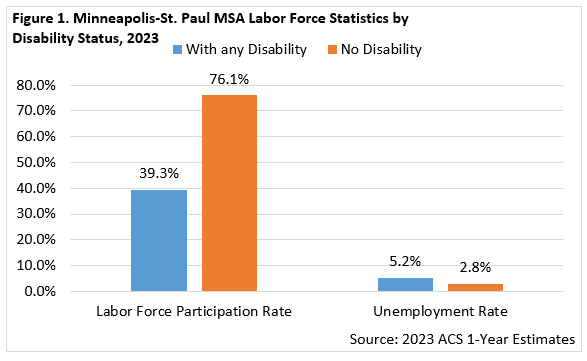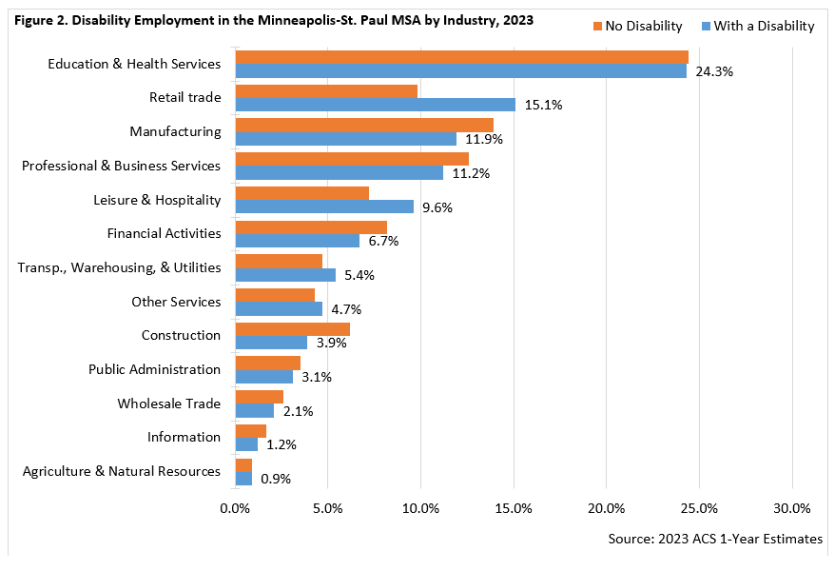 The Minneapolis-St. Paul metropolitan area is a national leader in finance, advanced manufacturing, agriculture and retailing.
The Minneapolis-St. Paul metropolitan area is a national leader in finance, advanced manufacturing, agriculture and retailing.
Medical devices, electronics and processed foods are strong suits recognized globally.
Want the freshest data delivered by email? Subscribe to our regional newsletters.
10/21/2024 12:48:28 PM
Tim O'Neill
October is National Disability Employment Awareness Month (NDEAM), a time to celebrate the value and talent workers with disabilities add to America's workplaces and economy. This year's theme, "Access to Good Jobs for All", was chosen to highlight our commitment to ensuring disabled workers have access to good jobs every month of the year. Along with the U.S. Department of Labor's Office of Disability Employment Policy, the Minnesota Department of Employment and Economic Development (DEED) also recognizes the importance that workers with disabilities bring to the state's labor market and economy. Through DEED's online resources, including Vocational Rehabilitation Services, those with disabilities can develop work skills, find suitable jobs and live as independently as possible. DEED also has resources for employers looking to hire and retain workers with disabilities.

According to the U.S. Census Bureau's American Community Survey (ACS) 1-year estimates, the Minneapolis-St. Paul Metropolitan Statistical Area (MSA) was home to nearly 370,000 people with reported disabilities who were 16 years of age and older in 2023. As such, over one-in-ten (12.5%) of the region's population 16 years of age and older had a reported disability.
Looking closer, just over 144,600 people with disabilities participated in the region's labor market. More specifically, about 137,100 people with disabilities were employed in the region while about 7,500 were unemployed. Overall, in 2023, these numbers equated to a labor force participation rate of 39.3% and an unemployment rate of 5.2% for people with any disability in the Minneapolis-St. Paul MSA. This labor force participation rate was significantly lower than the respective rate for those persons not reporting a disability (76.1%), while the unemployment rate was significantly higher (2.8%) (Figure 1).
Lower labor force participation and higher unemployment are just two statistics that reveal the heightened challenges that those with disabilities face in the labor market. Data from the 2023 ACS 1-year estimates reveals two other obstacles that persist for many with disabilities: lower earnings and higher poverty rates. In 2023, those with reported disabilities had median earnings of $36,117 and a poverty rate of 17.8%. This compares to median earnings of $55,914 and a poverty rate of 6.3% for those with no reported disabilities. While facing heightened challenges, the data does show improvement over time for those with disabilities. For example, between 2022 and 2023, the median earnings for those with disabilities increased by 11.0%, or nearly $3,600. Meanwhile, the poverty rate declined from 18.8% in 2022.
Other labor market data from the ACS shows which industries in the MSA employ greater shares of people with disabilties. At the top, employing nearly one-quarter of people with reported disabilities, is Education & Health Services. This is followed by Retail Trade, Manufacturing, Professional & Business Services, and Leisure & Hospitality. Altogether, these five major industries employ nearly three-quarters of persons with reported disabilties. About two-thirds of persons with no reported disabilties are employed in these five industries (see Figure 2).
Data can reveal a lot about labor market conditions for people with disabilities. Labor force participation, unemployment, median earnings, poverty and industry employment are just a few examples. One can also dig into worker class, occupational employment, commuting characteristics, educational attainment, housing statistics and more. Of course, the data is just the beginning. Be sure to check out DEED resources online or in-person that assist those with disabilities to find work, start up a business, or assist employers with hiring and retaining workers with disabilities.

Contact Tim O'Neill, Labor Market Analyst, at timothy.oneill@state.mn.us.